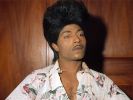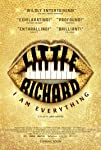Eye For Film >> Movies >> Little Richard: I Am Everything (2023) Film Review
Little Richard: I Am Everything
Reviewed by: Andrew Robertson

In the run-up to seeing this documentary by, among others, CNN and Rolling Stone, I happened to catch another feature length-documentary on Little Richard by the BBC. It's on iPlayer, this one will be in cinemas, briefly. Both rely heavily on archive footage and interviews, and, since their subject is dead, archive interviews. Both seek to contextualise Richard Penniman's meteoric passage, the "architect" of rock (and roll), and the burning that came with that speed as he changed environments. Neither quite succeeds, but Little Richard: I Am Everything seems to be trying harder, which makes its failings all the more striking.
There are some 26 credited interviewees, cousins, paramours, successors, more. Stars-studded among them too. There's a whole digression to be had about the title of an authorised biography and its use of 'quasar', an astronomical feature intrinsically bound up in brightness, blackness (or at least black-hole-ness), centrality, spin, and miscategorisation from the 1950s. They're not stars, they're something else. So too, perhaps, Little Richard. There are several talking heads from queer black academe, the difficulties in ordering those speak in part to intersectionality but also to an attempt to tell several different stories all at once. Something I may have noticed more because before seeing some of these stories I'd seen some of these stories told differently.

Not, in truth, as differently as between the original version(s) of Tutti-Frutti and the Pat Boone cover that outsold them. There are allusions to the white-washing of rock'n'roll, inevitable with Elvis, but despite mention of later musicians there's not a through line to Richard's own recantations and the backlash that became 'disco sucks'. A reaction to another genre born of unstraight non-white and youthful spaces that can draw a burning line right back to the often violent attempts to reimpose 'normalcy'.
Other hints unfollowed include discussion of the 'chittlin' circuit', named for the gizzards and innards of poultry, the scraps left over once the white meat is gone. That there were touring groups within it was something I knew, that these bands were often led by queer women creating spaces for drag shows was something I did not. There too is a whole set of pathways alluded to that could have been followed to treasures themselves. From both these there is a brief discussion that 'appropriation' might often be better expressed as 'obliteration', for all the debt owed to Sister Rosetta Tharpe the essence here is not translation uncovered but transgression buried. That makes the decision not to further explore these hidden histories all the more surprising.
There's space to talk about some of the injustices. For all his influence Little Richard was not lauded with the prizes he deserved. Circumstances meant he missed his induction to the founding group of the Rock And Roll Hall Of Fame, one of several stories I didn't know. Among the hundreds of media sources, including plenty of interviews, some more context would have been useful. Attempting to date talk show appearances by the subject's appearance is difficult enough, but it's made more so by the messiness of Richard's story. There are ways and means to achieve if not order then drive, a rhythm, a pace.
That's something the film often undercuts. In sequences described in the credits as 'dreamscape', other musicians interpret key works in unusual circumstances, usually dressed with or at least superimposed by seeming digital glitter. Less gilding the lily than over-egging the pudding. There are several moments of an almost cloying richness. Montages of rocketry, giraffe licking, distending floral bulbs don't so much evoke nature pink of tongue (in cheek) as parodies one could see as a Naked Gun from an Airplane. There are moments of imposition too, a timelapse of sunlight through trees, of harmonic interference on the surface of a coffee cup. These weren't so much additions as subtractions, distractions.
There's mention of segregation, of the impact that had on touring bands who might be playing two shows a night to differently mixed audiences. There's less mention of how American acts were received in the UK, nor how contextually complex that was for audiences of the transatlantic baby booms. There's a whole class of riots from the Second World War of (usually Commonwealth) troops reacting badly to American efforts to keep those they considered 'coloured' out of spaces they felt were theirs. That this would manifest as the 'British Invasion' where music created by Black artists from the South was sold back to the USA by English artists from the North (or at least Liverpool) is again somewhat discussed but there's a whole set of routes (and roots) not taken.
When the film closes with another sequence, less experimental than some of the other collages, it features more of Harry Styles than it does of Lil Nas X and Lizzo combined. To do so when ostensibly trumpeting the influence a queer black artist has had seems weirdly ironic, but it didn't feel that it was done from a place of self-consciousness. Though one of the elements of camp is archness the film rarely seems self aware. It sometimes ponders, occasionally posits, but rarely sticks a pose.
Which is a shame. There are some fascinating stories, here, ones differently told in Shane McCormack's Little Richard: King And Queen Of Rock'n'Roll. If nothing else that BBC film features interview with surviving Beatles, while Lisa Cortes' film features interview with surviving Rolling Stones. Tamir Kali-Brown's music struggles in context as it's near enough boilerplate documentary aural wallpaper, unable to compete with steam-train propulsive honky-tonk and percussive piano. Though often the stand-up staccato of kicked key-boards is reinterpreted as dreamy lounging, and that consideration feels inconsiderate. To reinterpret the revolutionary as relaxing is to undermine the underdog.
There are some striking moments on the removal of blackness (and queerness) from the history of rock'n'roll, but both are done disservice by not talking about successors like disco and (etymology aside) punk. There's mention of lawsuits and the music industry but there'd be room to talk about the numbers behind 45s and the money in matinees. In one of the bits of archive I was caught by a bus advert for Fremlins brewery, and spent some time wandering down an etymological rabbit hole for a word I'd thought much older. I shan't spoil it, you're probably looking at this on a gizmo that'd readily allow you to wander down that same course yourself. It struck me though that it was another point where the film showed or mentioned something and didn't dig deeper. Archeology is not only about uncovering, it's about context, and having marked out its trenches and blown off some dust the film didn't seem to want to take the time to further delineate or defend them.
In an age of streaming we're hitting a point where many things that would have been films are now television shows, and sometimes that's for the best. Documentary should have an interesting subject, and talk about it in an interesting way. If you've not got one the other one will do, but when your subject is as compelling then living up to them's on you. I was minded of Memory: The Origins Of Alien, which advanced a theory that wasn't just unsupported by the text but that it didn't seem to want to support itself. I Am Everything isn't quite as bad. I'd say it's undoubtedly the case that in Little Richard there was a voice, even a generational one, with massive cultural impact, rooted in the queer Black experience of the 1950s. Almost every word of that would alone justify an hour of examination, with more to say in it than un-Bowdlerised lyrics. In trying to cram all of the things it seems to want to try to talk about into a single feature it's not so much greatest hits as a mediocre medley.
Reviewed on: 28 Apr 2023If you like this, try:
20 Feet From StardomBuddy Guy: The Blues Chase The Blues Away
The Wrecking Crew



















